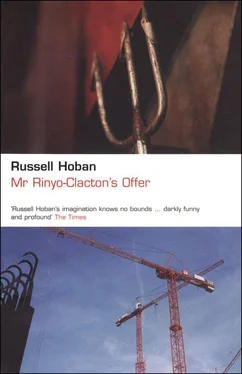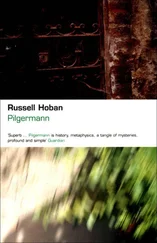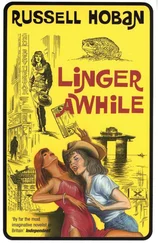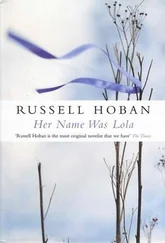Hendryk has his lower part flat on the floor and his upper part going up the wall but when you see him through the peep-hole he sits solidly on the floor with space all around him. There are no lenses in the peepholes and no mirrors in the box; the illusion is achieved by distorting a two-dimensional painting and controlling the angle and field of view in such a way that an undistorted three-dimensional scene is made to appear through the peep-holes.
It would have been a great deal simpler and certainly no more time-consuming to build a three-dimensional model of this interior but no, the illusion is the thing; and to produce this illusion van Hoogstraten had to work out the most abstruse calculations in perspective before painstakingly painting the walls and floor of the box. And the custodian of this illusion, the one who steadfastly contemplates it and meditates on it, is Hendryk. Inside his painted head he has of course his own illusory thoughts; we’ve had many interesting conversations and as often as not I find him helpful. Today, however, Hendryk gave me nothing. ‘What,’ I said, ‘am I all alone then?’
‘Never, dear boy!’ said the voice of Mr Rinyo-Clacton. Yes, there he was, no more smartly dressed than I, wearing jeans and a blue anorak, his smell compounded and intensified by the wet Gore-Tex.
‘Have you been following me?’ I said.
‘Not really. You just happened to be ahead of me as I was coming here. That dog is really something, eh? That dog is at the heart of the illusion of reality, wouldn’t you say?’
‘I’d prefer not to say just now if you don’t mind.’
‘Mind? Why should I mind? I respect your intellectual privacy. Let’s have lunch, shall we?’
‘Thank you but I think I need to be alone for a while.’
‘Right you are, Jonathan. I’m off then, see you tonight at the opera.’
I didn’t say anything. I watched him go, then I tried Hendryk again and again he gave me nothing. I abandoned the peepshow and fell back to a secondary position, Room 16 and de Hooch’s The Courtyard of a House in Delft. The clean-swept courtyard and its tutelary broom, the goodwife with her daughter, and seen through a red-brick archway, the shadowy figure of a second woman with her back to the observer, standing like a sentinel guarding that cloistered domesticity — everything in that picture invited me to rest awhile in its quiet world. But today there was no rest. I had a solitary lunch at The Brasserie, then I went out into the rain again.
‘Hello,’ said a woman’s voice.
‘Is this Katerina?’ I said.
‘Yes.’
‘I’ve got one of your handbills and I think I need a no-bullshit modern psychic. Can I make an appointment to see you?’
She didn’t answer. After a few seconds I said, ‘Hello? Are you there?’
‘Sorry, I was still listening to your voice.’ Her own voice was very shapely, with a slight German accent. ‘You want to see me?’ She said it as if she meant the actual seeing, and there came to mind the Caspar David Friedrich painting of his wife, seen from behind, standing at a window and looking across the River Elbe at a row of distant poplars.
‘Yes,’ I said. ‘You sound as if you’re standing at a window looking across a river.’
‘Like the Friedrich painting? No, I’m standing in the kitchen looking at a dripping tap. What is your name, please?’
‘Jonathan Fitch.’
‘Your voice troubles me, Mr Fitch. What do you think I can do for you?’
‘I don’t know, but talking to you seems to be the next thing for me to do. What do you charge?’
‘Twenty-five pounds if I can do something, nothing if I cannot. It comes and goes — sometimes yes and sometimes no. I’m seeing blue eyes, fair hair. Am I right?’
‘Yes. What else do you see?’
‘Nothing. I’m hearing that you’re afraid, yes?’
‘Yes.’
‘Me too. This is not unnatural to the human condition. Even sometimes it is useful. Can you be here in a quarter of an hour or so?’
‘Yes, I can.’
‘OK, you come, we talk — we see how it goes.’ She gave me her address. ‘I am Flat A; the name on the buzzer is Bechstein, like the piano.’
She was in Earl’s Court Road, a little way past the Waterstone’s at the corner of Penywern Road, in one of those big white Victorian houses converted to flats. When I came up the steps I saw a silver-haired woman looking out of the front window. I buzzed the Bechstein button, said I was Jonathan Fitch, and she came to the door. In her sixties, I thought; hair in a Psyche knot. She would have been a beauty when young — quite tall, with the daring look of one who might have parachuted behind enemy lines. Wearing an old grey cardigan and a faded print dress. Black stockings and snakeskin shoes that must have been fifty years old. I wondered if she was seeing into my mind where my night with Mr Rinyo-Clacton was replaying itself more or less continuously.
‘So,’ she said, shaking my hand, ‘here are you and it’s very bad, that I already feel. Come in.’ From the next floor came the sound of Pelléas et Mélisande. Also the smell of something with a lot of garlic. ‘Mr Perez,’ she said, ‘in the flat above me, is a heavy Debussy-user.’
‘It’s a small world.’
‘He wears two-tone shoes, carries a malacca cane, and has an extensive record collection that I have come to know very well. Being psychic I predict Ravel within the next hour.’ Pelléas and the smell receded as she closed the door of her flat behind us.
The high-ceilinged front room, the one I’d seen from the street, had nothing in it but a table and two chairs. There was an Art Nouveau lamp on the table making a little pool of light in the dusk that was gathering in the room. The white walls were bare except for a large framed print of Dürer’s Melencolia.
I hadn’t looked at that engraving for a long time, and seeing the darkly brooding winged woman or angel now I was struck by the energy of her brooding, the power in it; her thinking was not simply contemplative, it was going to make something happen: what with the dividers in her hand, the plane and saw, the hammer and tongs and other ironmongery, she seemed to be in the planning stages of some decisive action. The sandglass behind her right wing — surely that indicated that time was running out. And the bell nearby — for whom and for what would it ring? Or had it already rung? That sleeping dog, was she going to let it lie? And what about the polyhedron — was that not a reminder of the many sides of everything? Angel or woman, Melencolia with her wings could rise above the immediate problem for a longer view. The dog, such a very thin dog with its ribs sticking out, looked like a greyhound, a dog that hunts not by scent but by sight — it sees its prey and gives chase. On the wall behind the figure in the picture was a magic square in which all the numbers added up to thirty-four whether you did them vertically, horizontally, or on the diagonal.
Melencolia was not alone in the picture. Seated by a ladder and a pair of scales (Justice?), either close by or on the polyhedron (hard to make out which), was a surly winged infant, possibly asleep or perhaps just sulking. Was he the child of Melencolia? The picture seemed full of clues and portents, like a whole deck of Tarot cards. Undoubtedly Dürer, when he engraved Melencolia in 1514, had his own symbology in mind but now the picture was alone and independent of its maker; it could say what it liked, speak freely to any stranger and differently to each. I was troubled by that surly child; what would he grow up to be?
‘You like melancholy?’ said Katerina. ‘For you it’s a normal state, yes?’
Читать дальше












